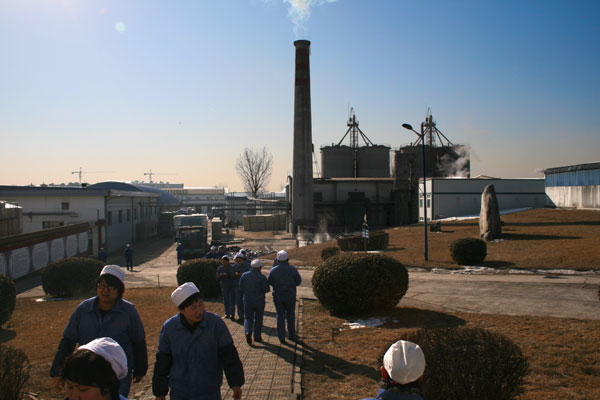Erguotou Factory Tour: hello and good baijiu
- By William Wang
 0 Comment(s)
0 Comment(s) Print
Print E-mail CRI, February 6, 2013
E-mail CRI, February 6, 2013
|
A smokestack releases plumes of steam as workers at the Erguotou baijiu factory in Beijing go about their business. [Photo: CRIENGLISH.com/William Wang] |
Any trip to China (especially Beijing) would be incomplete without a sampling of baijiu.
Baijiu is deeply ingrained in Chinese culture. As a traditional means of celebrating, it is commonly drunk at weddings and political dinners.
Baijiu might literally translate as "white wine," but in fact it is much less innocent than that. It is an extremely strong distilled alcoholic beverage with a taste that must be acquired (to put it mildly). Baijiu prices run the gamut, but the Erguotou brand can be seen in every corner store around the capital, where small bottles sell for under a dollar. Subsidized by government funds, Erguotou baijiu is the perfect blue-collar way to get drunk.
Everyone knows where to get it, but few know where it comes from. Beijing is the home base for Erguotou factories, and the China Culture Center periodically offers tours of the Niulanshan factory in northwestern Beijing.
After an hour's drive from downtown, a busload of visitors filed out into the sunshine and open air. The entire group was amazed to find that every breath of air on the premises was heavily laden with an unexpected scent reminiscent of syrup and…bacon.
A steady flow of workers clad in blue coveralls streamed past the visitors, set on reaching their various destinations. A tall smokestack billowed white steam into the chilly Beijing air.
The first destination of the tour was the building where the "light fragrance" baijiu was being distilled. Steaming brown piles of sorghum had been discarded on the concrete just outside the front gates.
Inside, the feeling was more akin to the interior of a barn than a wine distillery. Sorghum was ground up in a machine before a worker spread it out in a giant cylindrical steamer. Men were busy shoveling brown steamed sorghum onto a conveyer belt that carried it up to a destination obscured by plumes of vapor.
The adjacent warehouse was filled with 50 rectangular "tubs" pressed into the tile floor. Weathered striped tarpaulins would cover the "cooked" sorghum for up to 23 days while the fermentation was completed. Afterwards, the fermented sorghum would have cemented into a block that in turn would be heated to distill the alcohol stored within it.
In the corner, a couple of large metal cylinders with pipes sprouting from their bottoms and tops gently rumbled and dripped with condensation. A pipe stemming from the smaller one spewed freshly distilled baijiu into a sort of wheelbarrow canister.
Tour guide Liu pulled out a cup and began pouring smidgens of the liquor into paper cups. This raw version of baijiu was definitely different from the 55 percent alcohol baijiu available on store shelves. With up to 70 percent alcohol content, visitors were cautious about seeing how much punch it packed. Irena from Russia braced herself for a swig. "I'll probably die," she giggled through gritted teeth, "because I don't usually drink." But she bravely tipped her head back and the clear liquid slid down her throat.
"It's horrible," she gasped, eyes blinking away the fumes. "It's like distilled alcohol. That's what it is."








Go to Forum >>0 Comment(s)